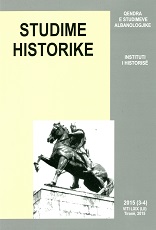Veprimtaria e diplomacisë shqiptare në Paris në mbyllje të Konferencës së Paqes (14 janar – 3 mars 1920)
The activity of the Albanian diplomacy in Paris at the conclusion of the Peace Conference (14 January to 3 March 1920)
Author(s): Marenglen VerliSubject(s): Diplomatic history, Interwar Period (1920 - 1939)
Published by: Qendra e Studimeve Albanologjike
Summary/Abstract: Peace Conference in Paris, organized after the First World War by the victorious powers, France, Britain, the United States and Japan, among others, addressed the issues of borders and the status of the Balkan states and within them the "Albanian issue". Although neutral in the global conflict, Albania risked to be annihilated.Albanian official delegation of the interim government of Dürres, who went to Paris, soon was convinced that not only the correction of past injustices against Albania was not happening, but the new danger was threatening to fatal. Drawing position and omissions didn’t bring any benefit. To the great powers, particularly France and Britain, Albania was the country to be sacrificed again in order to normalize the situation in the region.Accord or compromise of 13-14 January 1920 was the worst aspect. France, UK and Italy, in the absence of the representative of the US, adopted a resolution that was opposed not only by the US but also Yugoslavia. Right from this moment, the developments in the Albanian territory, diplomatic and popular movement, took an interesting direction. Therefore, there is space for the historiography to deepen its overview. This article aims to enlighten a period of several weeks after the 14 January compromise that significantly increased the role of the Albanian factor in making decisions for the future of Albania.On March 6, the US president gave a definitive answer to "The Adriatic Case."By supporting the proposal for direct talks between Italy and Yugoslav, in order to flush the contradictions between them, the head of the White House stressed that the Albanian issue "should not enter into the discussion proposed between Italy and Yugoslavia" and that he "will not approve any plan that would give Yugoslavia a territorial compensation in the northern part of Albania, for what may rip off somewhere else ".US president's determination forced European allies to withdraw and came to help to both Yugoslavia and Albania. Yugoslavia had now the opportunity to negotiate directly with Italy, as for Albania the risk of division was postponed and Albanians gained a lot of valuable time which they knew how to exploit.
Journal: Studime Historike
- Issue Year: 2015
- Issue No: 03-04
- Page Range: 111-136
- Page Count: 26
- Language: Albanian
- Content File-PDF

